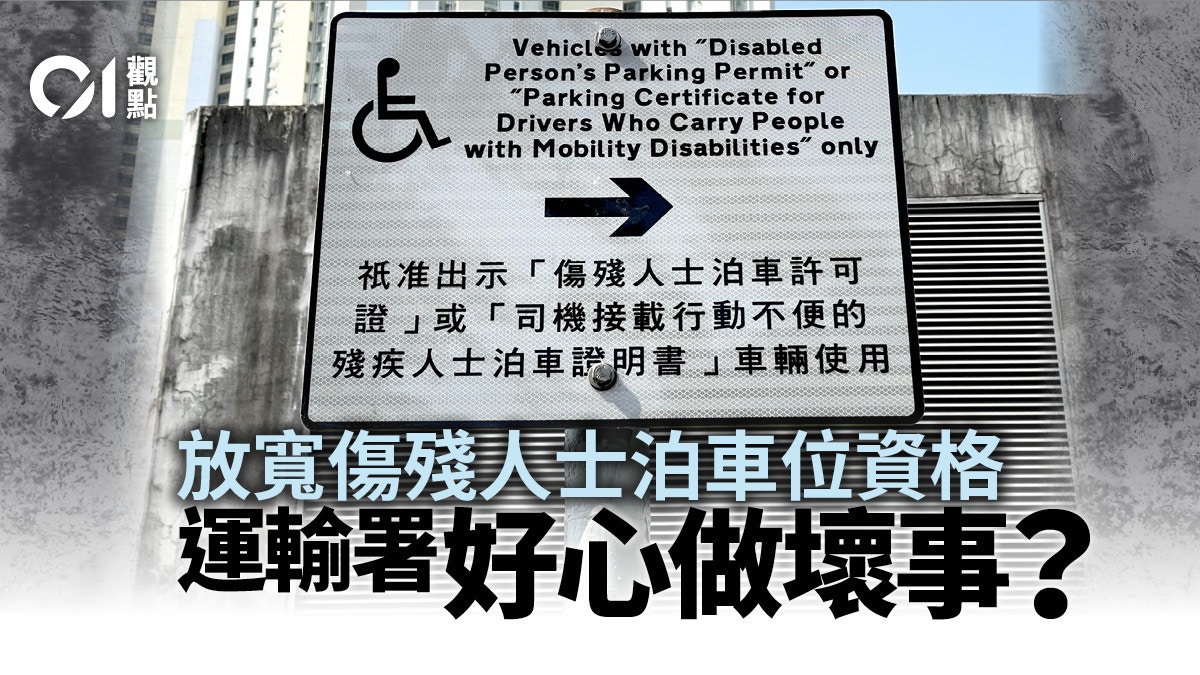The Office of the Ombudsman launched an active investigation on Thursday (23rd) to study the work of the Transport Department in handling special parking spaces for the disabled on the roadside, especially in response to the current chaos that the parking spaces are abused but difficult to combat, and put forward suggestions for improvement.
The government needs to ensure barrier-free travel for people with disabilities, and the Office’s actions are worthy of recognition.
Throughout the experience in other places, it is feasible to use administrative or technological means to make abusers know that it is difficult to retreat, and it is worthy of reference by the Office.
At present, there are 447 on-street parking spaces dedicated to the disabled in Hong Kong. In the past, they were only used by disabled drivers who hold "Parking Permits for Disabled Persons" ("Permits" or commonly known as "Blue Permits").
In response to the requirements of the public, the Transport Department shall treat the travel needs of persons with disabilities and their escorts who are unable to drive due to their physical or lower limb disabilities in a fair manner. Starting from the end of January this year, the Transport Department has extended the relevant parking spaces to those with limited mobility. The number of eligible persons with parking certificates for persons with disabilities ("certificates" or commonly known as "grey certificates") has increased from 1,816 to 3,606, that is, eight certificates are competing for one place.
The PCPD believes that the original intention of the change is good, but it has received complaints that the demand for berths is even more in short supply, making it impossible for real users to use it, and it is difficult for law enforcement officers to find violators.
Indeed, the Department currently does not stipulate how long each eligible vehicle can be used, even if the vehicle is parked for a long time, it is not a violation of the regulations.
However, due to the limited parking spaces in Hong Kong, the long-term parking of one vehicle means that another vehicle cannot use the parking space.
Of course, increasing parking spaces can alleviate the tension in parking spaces, but if parking behaviors are not regulated, the problem will never be solved.
Wide spaces are reserved on both sides of the disabled parking spaces to allow drivers to get on and off the wheelchair.
(Photo by Huang Jinghong)
Octopus, Internet of Things may help
The on-street parking spaces were originally intended for temporary parking. In order to meet the original intention of users, one of the feasible methods is to pay first and then refund. Eligible persons can return the parking within one month with their personal Octopus card at the end of each month The cost is similar to the transportation subsidy promoted by the government.
Since the Octopus records the parking time, if the parking time is too long (for example, six hours), the government may not refund the fee to prevent long-term occupation of parking spaces even if they are eligible.
As for the problem of occupancy by unqualified persons, or whether it is difficult to prove whether the parked gray-licensed vehicles have been carrying disabled persons, it is of course possible to rely on law enforcement officers to inspect and combat them, but it is easy to miss the net.
The authorities may consider using technology to install detection devices in parking spaces and park only qualified vehicles.
For example, parking spaces for people with disabilities in Huesca, Spain are equipped with sensors. Eligible people with disabilities can use their smartphones to register parking spaces on the city government website in advance, while non-registered people will be detected by sensors.
Although this move may not be able to combat all abuse cases, for example, drivers can still use the phone to register with the disabled when they are not picking up the disabled, but at least it will make the use of berths more laborious.
Another advantage of this move is that the driver can instantly know where there are vacancies.
In general, the Transport Department has rashly relaxed the eligibility for the abuse of roadside berths for people with disabilities, which only aggravated the problem.
Perhaps improving the parking needs of people with disabilities is a relatively small issue, but barrier-free transportation is also being promoted all over the world, and society and governments should try their best to make everyone have equal rights to reach their destinations.
If the PCPD can identify the root cause of the problem and propose improvement measures, it will further promote the harmonization of the disabled and the health and benefit society.
The Office of The Ombudsman also investigated the illegal construction of village houses in the New Territories. Why did the Ombudsman's investigation of waste recycling "three-color barrels" fail?















